Coronavirus Keeping Americans at Home for Summer
Study Shows Most People Will Avoid Traditional Summer Activities
Published May 21, 2020
The novel coronavirus (COVID-19) pandemic has disrupted life as we know it, and a recent Gallup poll showed that 68% of Americans say that the availability of a vaccine is a very important factor in their decision to return to normalcy. Another poll, from Kaiser Family Foundation, found half of American adults feel that "'the worst is yet to come' when it comes to the coronavirus outbreak in the U.S."
As states are beginning to lift at least some social distancing measures, we wanted to find out how COVID-19 is limiting (or not) people’s willingness to participate in popular summertime activities compared to previous summers.
We surveyed over 1,000 Americans about their planned summer activities, what activities they’re avoiding this year and what factors are shaping their decisions.
According to our data, at least half of Americans are “not too likely” or “not at all likely” to participate in certain traditional summer activities in 2020, such as going to a baseball game, going to the beach or spending time at a public pool.
We also found that Republicans are overall much more willing to venture out for public summer activities than Democrats and unaffiliated voters.
Key Findings
Americans in 2020 seem far less willing to go out in public for summer fun than they did in 2019.
That fact alone is not surprising, but what’s notable is the extent to which people will avoid public activities this year:
- 69% of people who visited a public swimming pool in 2019 will most likely not do so this year.
- 52% of people who went to a public beach last year are “not too likely” or “not at all likely” to do so this year.
- Nearly half (49%) of people who attended or hosted a cookout last year don’t plan on doing so in 2020.
- 63% of Americans who attended a baseball game in the summer of 2019 won’t likely do so this year.
- Almost 3 out of 4 people (74%) of people who attended a concert or a music festival last year don’t plan on doing so in the summer of 2020.
- 67% of parents who sent their child to summer camp are “not too likely” or “not at all likely” to send them to camp again this year.
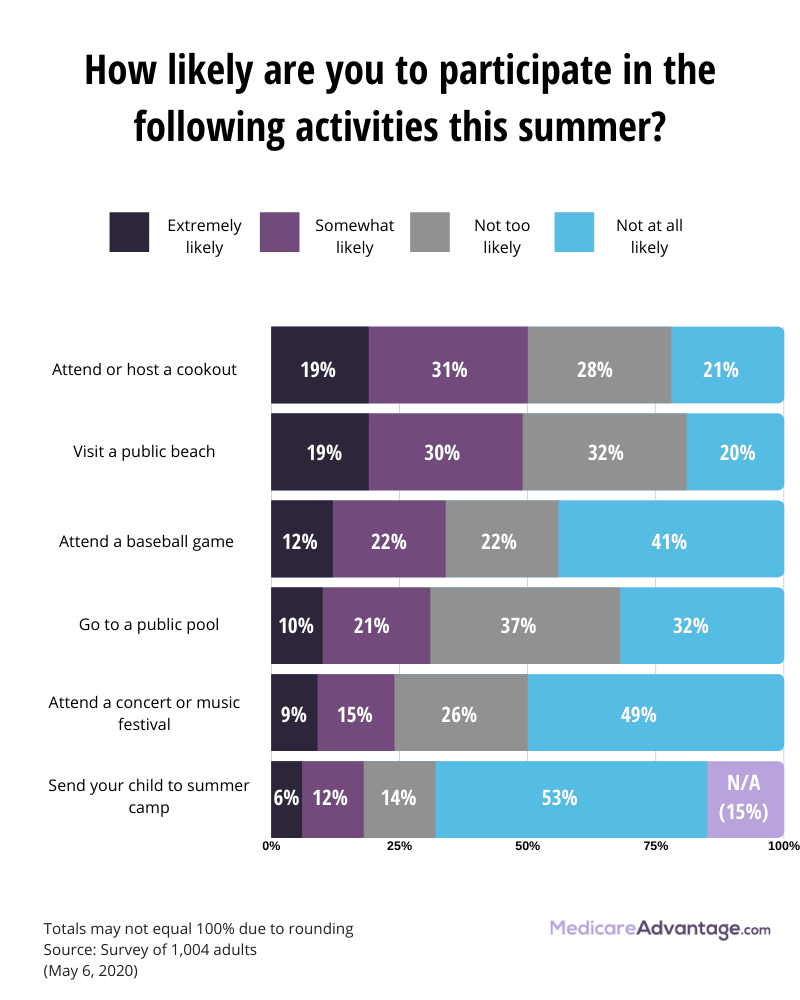
Some other notable findings include:
- The most important factor in most people’s decision whether or not to participate in public activities this summer is whether there’s a significant decrease in new COVID-19 cases and deaths in their state.
- The second most important factor for most people is the availability of a COVID-19 vaccine, although a vaccine isn’t likely to be available before the end of the 2020 summer season.
- Survey respondents are almost evenly split on whether or not the COVID-19 outbreak has had a substantially negative impact on their income, with 55% of people saying it hasn’t caused a substantially negative impact and 45% saying that it has.
- When provided with a list of potential summer activities, nearly half of all respondents say their number one most preferable activity would be to fill a small swimming pool with water in their backyard and simply hang out.
- Nearly 2 out of 3 people who won’t go to a concert or music festival this summer won't do so out of fear of contracting the virus. This was the activity most associated with high levels of fear regarding COVID-19 infection.
- Nearly 1 out of every 5 respondents is concerned about getting a face mask tan this summer.
Going to the Pool
Only 31% of people who visited a public pool in 2019 say they are either “likely” (21%) or “extremely likely” (10%) to do the same this summer. The remaining 69% report they are either “not too likely” (37%) or “not at all likely” (32%) to visit a public pool this summer.
72% of those who say they are not likely to visit a pool this summer cite a fear of contracting (55%) or unknowingly spreading (17%) COVID-19 as their reason.
These 2 fears were the most commonly cited reasons people will avoid most of the public activities included in the study.
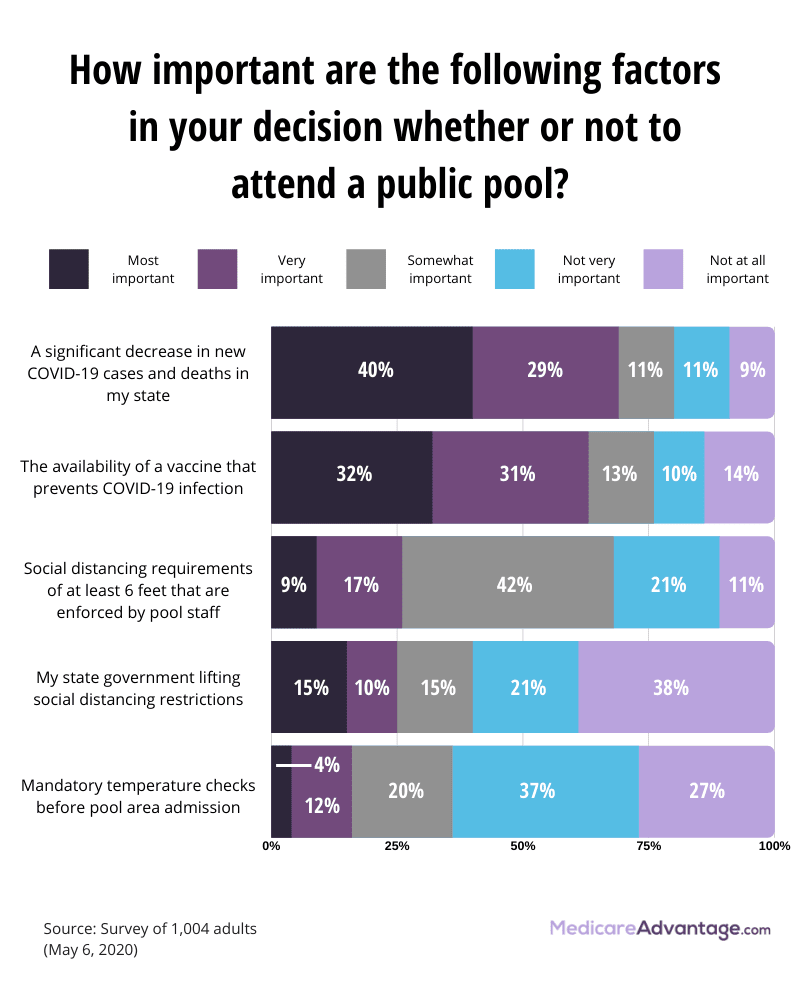
Only 4% of respondents say that mandatory temperature checks before entering the pool is the most important factor in their decision.
Most people say they’re primarily concerned with seeing a significant decrease in COVID-19 cases and deaths in their state as they consider whether or not to go to the pool.
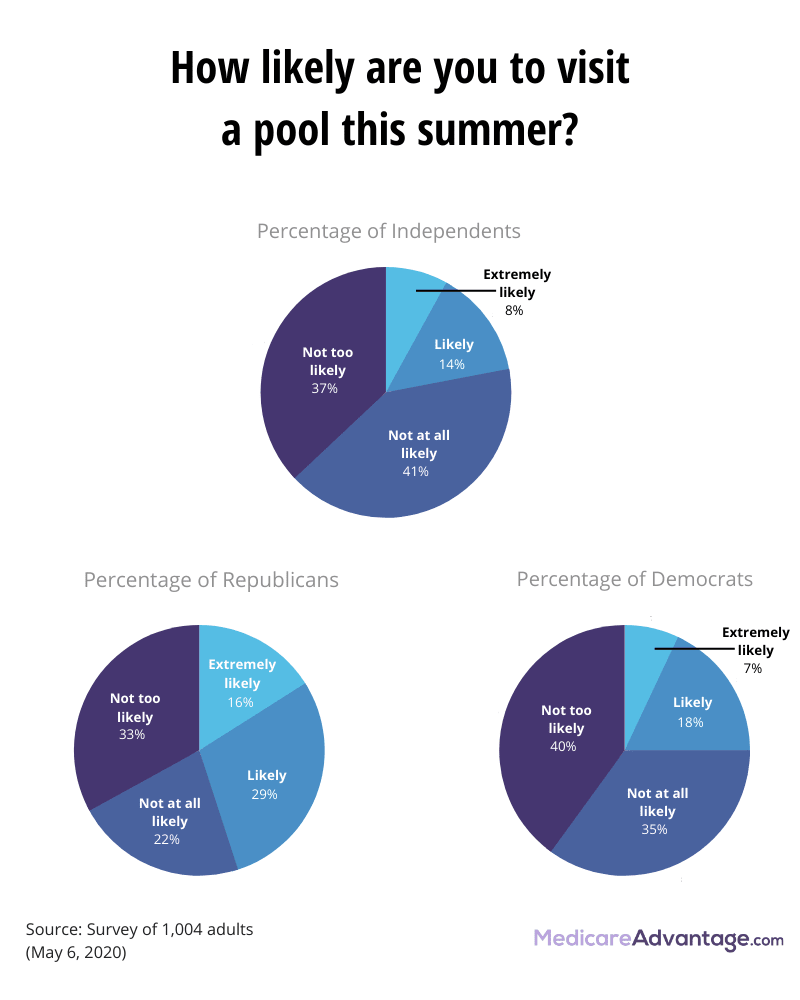
45% of Republicans say they are “likely” or “extremely likely” to visit a public pool this summer, while only 25% of Democrats and 22% of Independents report the same willingness to visit a pool.
Hitting the Beach
Of all respondents who visited a public beach last summer, less than 1 in 5 (19%) say they are “extremely likely” to do so again this summer.
Over half of all respondents say they are either “not too likely” (32%) or “not at all likely” (20%) to go to the beach in 2020.
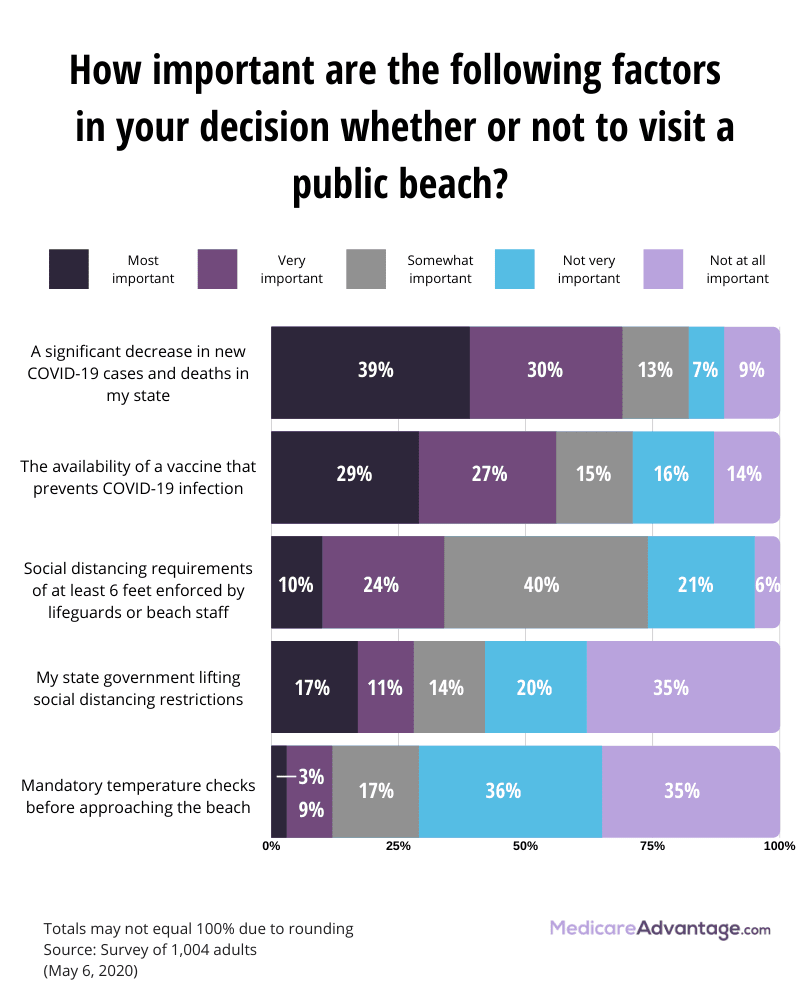
More than 2 out of 3 of respondents cite a “significant decrease in new COVID-19 cases and deaths in my state” as either the "most important" factor (39%) or a "very important" factor (30%) in deciding whether or not to return to the beach this summer.
57% of people report that the development of a COVID-19 vaccine is either the "most important" factor in their decision (30%) or a "very important" factor (27%).
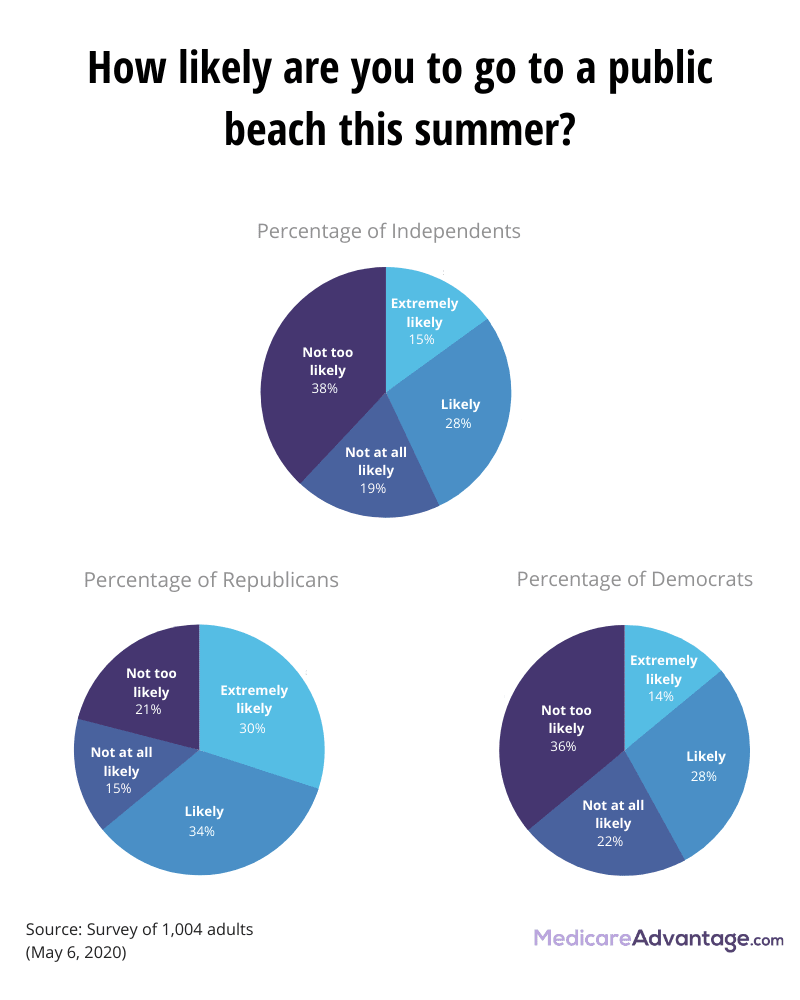
64% of Republicans are “likely” or “extremely likely” to head to the beach this summer, while only 42% of Democrats report having the same attitude.
Firing Up the Grill
Backyard barbecues are a summer staple, apparently even in the time of the novel coronavirus. Respondents seem to perceive cookouts as relatively safer and indicated the most willingness to participate in them this summer.
Still, nearly half of those who hosted or attended a cookout last summer report being "not too likely" (28%) or "not at all likely" (21%) to do the same this year. Less than 1 in 5 Americans say they are "extremely likely" to host or attend a cookout this summer despite doing so last year.
As with their responses about other activities, most people cite a fear of contracting (37%) or unknowingly spreading (19%) COVID-19 as their top 2 reasons for staying away from cookouts this summer.
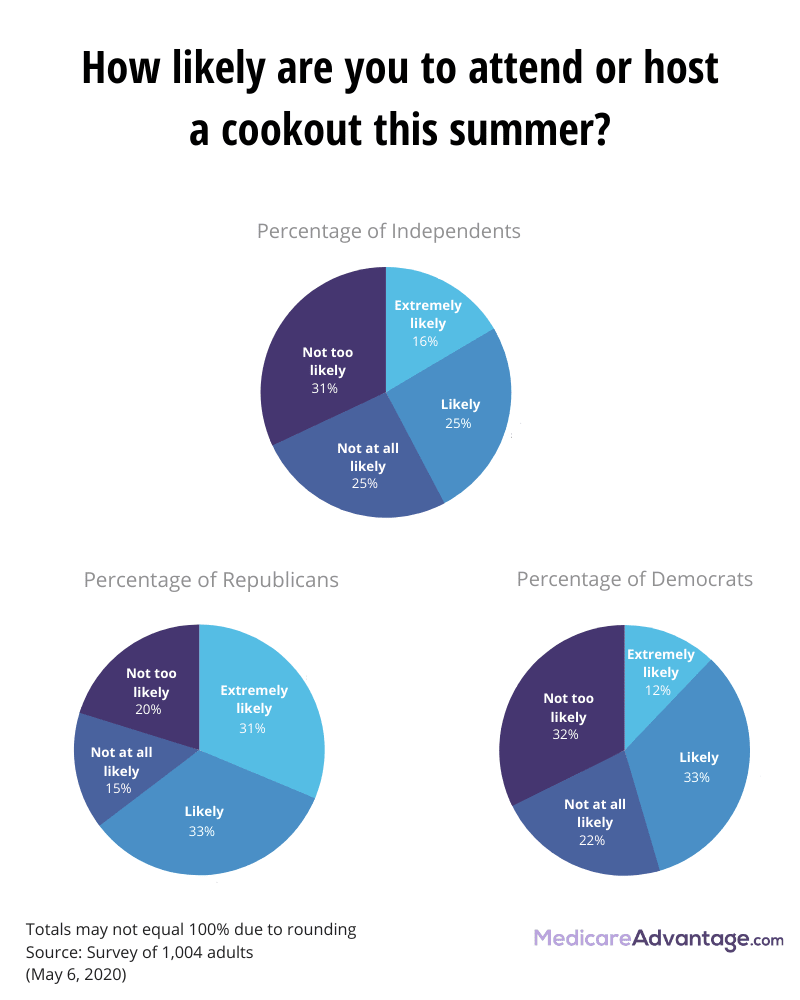
Far more Republicans plan to host or attend a cookout this summer than Democrats. 64% of Republicans are “likely” or “extremely likely” to host or attend a cookout, while only 45% of Democrats and 41% of Independents report the same willingness.
Heading Out to the Ball Game
Of all respondents who took in a baseball game in the summer of 2019, just 1 out of 3 are either "likely" (22%) or "extremely likely" (12%) to visit a ballpark in 2020.
More than 2 out of 5 people say they are "not at all likely" to attend a baseball game in 2020, despite having done so in 2019.
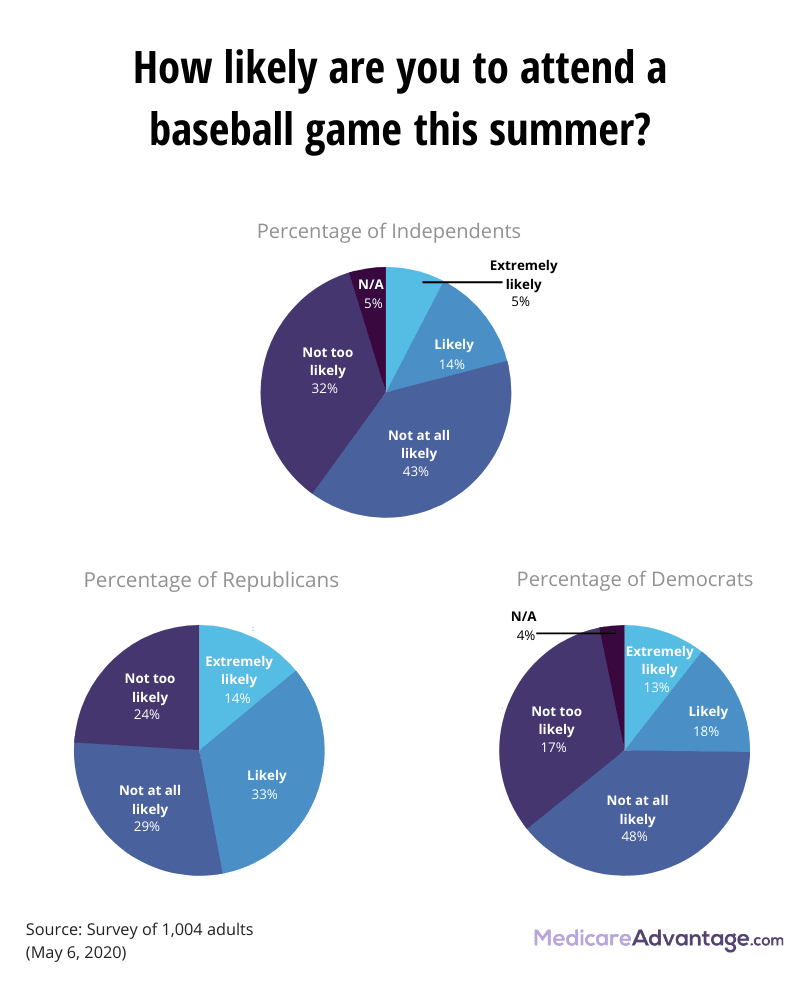
As with other activities, Republicans are much more likely to attend a baseball game, with nearly half (47%) saying they’re “likely” or “extremely likely” to do so.
Only 31% of Democrats and only 19% of Independents report similar attitudes.
Going to a Concert or Festival
Outdoor concerts and music festivals are popular summertime activities, but these are the types of events that respondents are the least willing to attend.
Just 9% of people who attended a concert or music festival in the summer of 2019 report being "extremely likely" to do so this summer, and only another 15% report even being "likely" to do so. That leaves 3 out of 4 would-be concert-goers tuning out in 2020.
Given the close physical proximity to other people that is typical at a concert, it comes as no surprise that nearly 2 out of 3 people who won’t go to a concert or music festival this summer won't do so out of fear of contracting or spreading the virus.
This was the activity most associated with high levels of fear regarding COVID-19 infection.
Going to a concert is also the activity for which the most people cite “economic difficulties due to the pandemic” as their main reason for staying away this summer. Nearly 1 in 5 people (17%) cite this as their primary reason for skipping concerts in summer 2020.
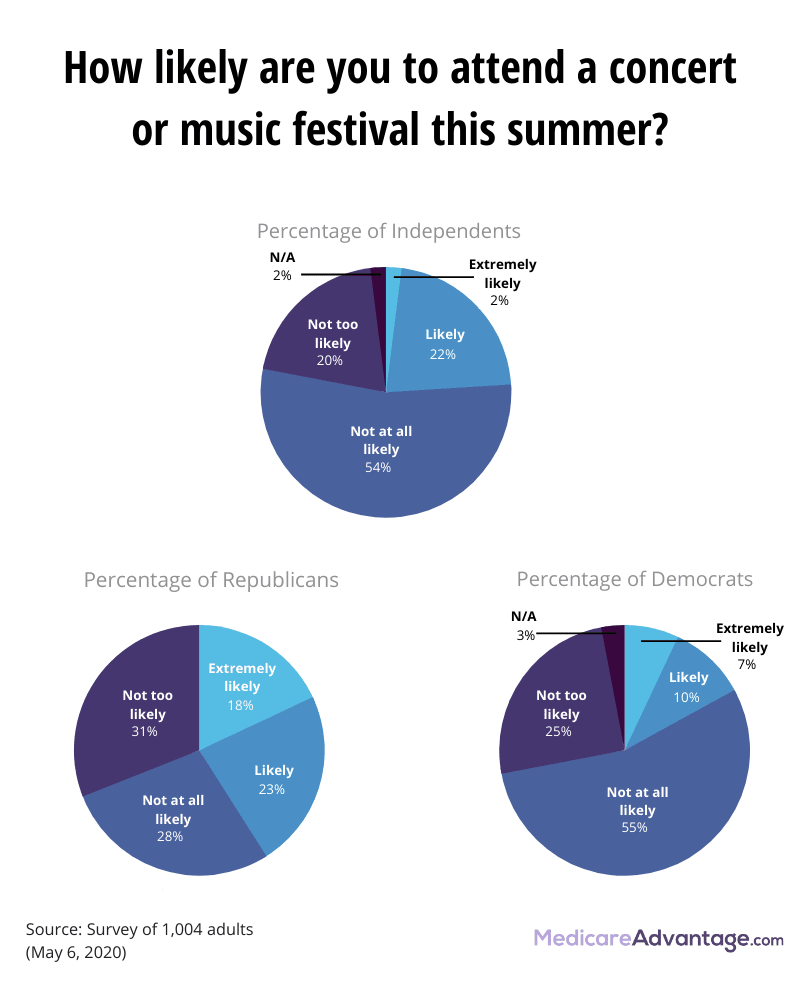
Republicans are far more likely to attend a concert or music festival this summer than Democrats and Independents. 41% of Republicans say they are “likely” or “extremely likely” to attend a concert, while only 24% of Independents and only 17% of Democrats answer similarly.
For those who won’t attend a concert or music festival this summer, twice as many Republicans than Democrats say the most important factor in their decision is the negative social stigma or embarrassment of potentially acting against health recommendations (11.5% of Republicans, 6.3% of Democrats).
Sending Kids to Summer Camp
Among parents who sent a child age 16 and under to a summer camp last year, just 12% report being "extremely likely" to ship them off to camp again this summer, with another 26% being only "likely" to do so.
More than 6 out of 10 parents report being either "not at all likely" (39%) or "not likely" (23%) to send their kids to camp this summer.
Roughly 1 in 8 people won’t send their child to summer camp this year because of economic difficulties due to the coronavirus outbreak.
Republicans, Democrats and non-affiliated voters report fairly similar attitudes about their willingness to send their kids to summer camp in 2020.
Popular Options
With COVID-19 disrupting many traditional summertime activities, what would people prefer to do when given a choice?
We asked respondents to rank 7 activities by their preference for participating in each this summer (despite any associated health risks).
| Activity | Rank (weighted by strength of response) |
|---|---|
| Fill a small swimming pool with water in my backyard | 1 |
| Go see a movie in a movie theater | 2 |
| Spend a day on a crowded public beach | 3 |
| Sit on the lawn at a crowded concert or festival | 4 |
| Sit on the front row at a crowded concert or festival | 5 |
| Visit a crowded public pool | 6 |
| Attend a crowded baseball game | 7 |
Nearly half of all respondents would choose to “fill a small swimming pool with water in my backyard” as their most preferable activity this summer, compared to just 2% who would most prefer to visit a crowded public pool or 22% who would prefer to spend a day on a public beach.
Methodology
This study was conducted May 6, 2020, using an audience pool gathered using Prolific, a polling tool. The total survey side included 1,004 respondents.
Participants were filtered based on completion time and failure to follow written instructions within the survey.
Age distribution:
18-24: 170
25-34: 371
35-44: 203
45-54: 135
55-64: 79
65+: 46
Gender distribution:
Female: 55%
Male: 43%
Other: 1%
Political affiliation distribution:
Democrat: 51%
Republican: 28%
Neither: 22%
Margin of error: +/- 4% (95% confidence interval)
This survey relies on self-reported data.
Fair Use Statement
Of course we would love for you to share our work with others. We just ask that if you do, please grant us the proper citation with a link to this study so that we may be given credit for our efforts.
Research and reports
Our research reports analyze a number of issues important to seniors, from health perceptions, medical communication, health habits, and more.
